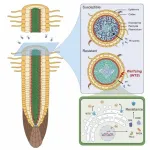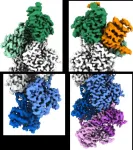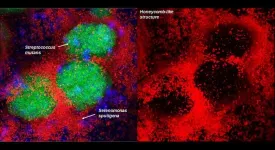(Press-News.org) June 8, 2023 — Showing people how their behavior compares to their peers is a commonly used method to improve behavior. But in the wake of a global pandemic that exacerbated health care providers’ job dissatisfaction and burnout, questions remain about the potentially negative effects of peer comparison on the well-being of clinicians.
A new study from the USC Schaeffer Center for Health Policy & Economics reveals fresh insights into the relationship between peer comparison and job satisfaction among clinicians. Published in JAMA Network Open, the study challenges prior findings that such feedback increases job dissatisfaction and burnout.
Researchers found that behavioral interventions aimed at improving performance can be designed to protect clinician job satisfaction and improve quality of care. To avoid negative impact, the research team discovered it is important for clinicians to have control over the behavior being evaluated or encouraged, such as ordering tests or whether to prescribe medication.
“Our research demonstrates that peer comparison aimed at improving performance can be designed in a manner that safeguards clinician job satisfaction,” said lead author Jason Doctor, co-director of the Behavioral Sciences Program at the USC Schaeffer Center and chair of the Department of Health Policy and Management at the USC Sol Price School of Public Policy. “Prior findings to the contrary don’t appear tied to peer comparison, but rather clinicians being measured for things they don't have full control over.”
The Importance of Methodology in Peer Comparison
Performance feedback using peer comparison is a widely used approach in healthcare to change behavior. Study authors emphasize the importance of methodology when conducting peer comparison intervention. They note the present study gave clinicians full agency over the outcome, kept performance private, did not restrict the number of top performers, and was successful in improving clinician behavior without lowering job satisfaction.
Doctor and his team evaluated data from their previously published research that assessed the impact of three interventions — Suggested Alternatives, Accountable Justification, and Peer Comparison — to reduce inappropriate antibiotic prescribing. In this study, they looked specifically at the data on peer comparison, where clinicians received an email informing them of their ranking, from highest to lowest, for inappropriate prescriptions compared to their peers.
The findings contribute to the ongoing dialogue surrounding healthcare quality improvement and clinician well-being.
“By better understanding behavioral interventions and developing more effective strategies, healthcare organizations can foster a sense of ownership and agency, leading to improved job satisfaction and decreased burnout rates,” said Doctor.
Additional study authors included Noah J. Goldstein, Craig R. Fox, Jeffrey A. Linder, Stephen D. Persell, Emily P. Stewart, Tara K. Knight, and Daniella Meeker. This study was supported by the National Institute on Aging grants R21-AG057395-01, R33-AG057395, P30AG024968, and RC4AG039115 (awarded as part of the American Recovery & Reinvestment Act of 2009) (Dr. Doctor, principal investigator).
About the USC Schaeffer Center
The mission of the Leonard D. Schaeffer Center for Health Policy & Economics at the University of Southern California is to measurably improve value in health through evidence-based policy solutions, research excellence, and private and public sector engagement. The USC Schaeffer Center is the result of a unique collaboration between the USC Price School of Public Policy and the USC Mann School of Pharmacy & Pharmaceutical Sciences.
END
Comparing doctors to peers doesn’t make them hate their jobs and may improve quality of care, new USC Schaeffer study finds
Interventions aimed at improving performance can be designed to protect clinician job satisfaction and improve quality of care
2023-06-08
ELSE PRESS RELEASES FROM THIS DATE:
Scientists discover how plants fight major root disease
2023-06-08
Researchers led by CHEN Yuhang and ZHOU Jianmin from the Institute of Genetics and Developmental Biology of the Chinese Academy of Sciences have shown how plants resist clubroot, a major root disease that threatens the productivity of Brassica crops such as rape.
The study, which uncovers novel mechanisms underlying plant immunity and promises a new avenue for crop breeding, was published in Cell.
Clubroot, a soil-borne disease, is the most devastating disease of Brassica crops. In China, approximately 3.2–4 million hm2 of agricultural land is affected by clubroot each year, resulting in a 20%–30% yield ...
The IL-17 protein plays a key role in skin ageing
2023-06-08
A team of researchers from IRB Barcelona and CNAG identifies the IL-17 protein as a determining factor in skin ageing.
Blocking the function of IL-17 reduces the pro-inflammatory state and delays the appearance of age-related features in the skin.
Published in the journal Nature Aging, the work opens up new perspectives in the development of therapies to improve skin ageing health.
A team of scientists from the Institute for Research in Biomedicine (IRB Barcelona) in collaboration with the National ...
University of Cincinnati study examines role of metabolites in disease treatment
2023-06-08
Each year, about 200,000 people in the United States are diagnosed with a bulge in the lower part of the aorta, the main artery in the body, called an abdominal aortic aneurysm (AAA).
New research from the University of Cincinnati examines the role a particular metabolite plays in the development of AAA and could lead to the first treatment of the condition.
The research was published in the journal Circulation.
“We started the study by examining whether AAA patients themselves had an increase in trimethylamine N-oxide (TMAO). We examined an American and Swedish ...
Study unravels the mysteries of actin filament polarity
2023-06-08
Actin filaments — protein structures critical to living movement from single cells to animals — have long been known to have polarity associated with their physical characteristics, with growing “barbed” and shrinking “pointed” ends. The ends of the filament are also different in the way they interact with other proteins in cells. However, the mechanism that determines these differences has never been entirely clear to scientists. Now, researchers from the Perelman School of Medicine at the University of Pennsylvania have revealed key atomic structures of ...
Colorful foods improve athletes’ vision
2023-06-08
Nutrition is an important part of any top athlete’s training program. And now, a new study by researchers from the University of Georgia proposes that supplementing the diet of athletes with colorful fruits and vegetables could improve their visual range.
The paper, which was published in Exercise and Sport Sciences Reviews, examines how a group of plant compounds that build up in the retina, known as macular pigments, work to improve eye health and functional vision.
Previous studies done by UGA researchers Billy R. Hammond and ...
Research puts lens on a new vision for land use decision making
2023-06-08
A new framework for making better and more transparent decisions about the use of our land could help to balance society’s demands upon it with protecting and enhancing the environment.
Researchers led by the University of Leicester have proposed a framework for decisions on land use, from nationwide policymaking to building happening at street level, that would involve the most representative range of stakeholders, from those with financial interests in the land to the local communities who use it and more besides.
Now published in the journal People and Nature, it encourages decisionmakers ...
'Most horrible’ brain tumor patients falling through healthcare cracks, study shows
2023-06-08
Patients suffering from the “most horrible” rare brain tumour are falling through the cracks of mental health provision, University of Essex researchers have found.
A recent study which interviewed patients and clinicians discovered survivors struggle to access therapy available for other serious illnesses, such as cancer, and there was a lack of specialised support.
For the first time, the mental health of British rare brain tumour patients was examined by psychologists and now researchers are calling for urgent changes to the health service.
Dr Katie Daughters hopes her findings –published in ...
Discovering cell identity: $6 million NIH grant funds new Penn Medicine research to uncover cardiac cell development
2023-06-08
PHILADELPHIA— Historically, scientists have studied how cells develop and give rise to specialized cells, such as heart, liver, or skin cells, by examining specific proteins. However, it remains unclear how many of these proteins influence the activity of hundreds of genes at the same time to turn one cell type into another cell type. For example, as the heart develops, stem cells and other specialized cells will give rise to heart muscle cells, endothelial cells (lining of blood vessels), smooth muscle cells, and cardiac fibroblasts. But the details of this process remain mysterious.
As a result of a $6 million, seven-year ...
Penn Dental Medicine collaboration identifies new bacterial species involved in tooth decay
2023-06-08
Philadelphia — Collaborating researchers from the University of Pennsylvania School of Dental Medicine and the Adams School of Dentistry and Gillings School of Global Public Health at the University of North Carolina have discovered that a bacterial species called Selenomonas sputigena can have a major role in causing tooth decay.
Scientists have long considered another bacterial species, the plaque-forming, acid-making Streptococcus mutans, as the principal cause of tooth decay—also known as dental caries. However, in the study, which appeared 22 May in Nature Communications, the Penn Dental Medicine and UNC researchers showed that S. sputigena, previously associated ...
Team finds reliable predictor of plant species persistence, coexistence
2023-06-08
CHAMPAIGN, Ill. — Like many ecological scientists, University of Illinois Urbana-Champaign plant biology professor James O’Dwyer has spent much of his career searching for ways to measure and predict how specific plant communities will fare over time. Which species in a diverse population will persist and coexist? Which will decline? What factors might contribute to continuing biodiversity?
In a new study reported in the journal Nature, O’Dwyer and his colleague, U. of I. graduate student Kenneth Jops, report the development of a method for determining ...
LAST 30 PRESS RELEASES:
The Lancet: First-ever in-utero stem cell therapy for fetal spina bifida repair is safe, study finds
Nanoplastics can interact with Salmonella to affect food safety, study shows
Eric Moore, M.D., elected to Mayo Clinic Board of Trustees
NYU named “research powerhouse” in new analysis
New polymer materials may offer breakthrough solution for hard-to-remove PFAS in water
Biochar can either curb or boost greenhouse gas emissions depending on soil conditions, new study finds
Nanobiochar emerges as a next generation solution for cleaner water, healthier soils, and resilient ecosystems
Study finds more parents saying ‘No’ to vitamin K, putting babies’ brains at risk
Scientists develop new gut health measure that tracks disease
Rice gene discovery could cut fertiliser use while protecting yields
Jumping ‘DNA parasites’ linked to early stages of tumour formation
Ultra-sensitive CAR T cells provide potential strategy to treat solid tumors
Early Neanderthal-Human interbreeding was strongly sex biased
North American bird declines are widespread and accelerating in agricultural hotspots
Researchers recommend strategies for improved genetic privacy legislation
How birds achieve sweet success
More sensitive cell therapy may be a HIT against solid cancers
Scientists map how aging reshapes cells across the entire mammalian body
Hotspots of accelerated bird decline linked to agricultural activity
How ancient attraction shaped the human genome
NJIT faculty named Senior Members of the National Academy of Inventors
App aids substance use recovery in vulnerable populations
College students nationwide received lifesaving education on sudden cardiac death
Oak Ridge National Laboratory launches the Next-Generation Data Centers Institute
Improved short-term sea level change predictions with better AI training
UAlbany researchers develop new laser technique to test mRNA-based therapeutics
New water-treatment system removes nitrogen, phosphorus from farm tile drainage
Major Canadian study finds strong link between cannabis, anxiety and depression
New discovery of younger Ediacaran biota
Lymphovenous bypass: Potential surgical treatment for Alzheimer's disease?
[Press-News.org] Comparing doctors to peers doesn’t make them hate their jobs and may improve quality of care, new USC Schaeffer study findsInterventions aimed at improving performance can be designed to protect clinician job satisfaction and improve quality of care





